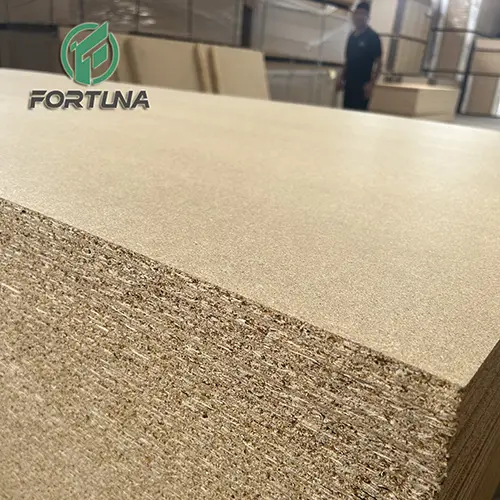Plywood Blog
A blog introducing information about Chinese plywood products and markets
Understanding Particle Board: A Comprehensive Guide
Particle board, commonly referred to as chipboard, is an engineered wood product that has gained popularity due to its cost-effectiveness and versatility. This guide explores the composition, manufacturing process, advantages, and common applications of particle board.


1. Introduction
Definition
Particle board, also known as chipboard, is an engineered wood product created from wood particles such as wood chips, sawmill shavings, and other wood residues.
Overview of Particle Board
Developed as an economical alternative to solid wood and plywood, particle board is manufactured by bonding wood particles with synthetic resin or glue under high pressure and heat.
2. Composition and Manufacturing Process
Materials Used
Particle board is composed of:
Wood Chips: Small wood fragments
Sawmill Shavings: Leftover materials from sawmill operations
Wood Residues: Other wood by-products
Manufacturing Steps
Collection: Wood particles are collected and sorted.
Bonding: Particles are mixed with synthetic resin or glue.
Pressing: The mixture is pressed under high pressure and heat to form boards.
Finishing: Boards are trimmed, sanded, and sometimes laminated for additional strength and aesthetics.
3. Advantages of Particle Board
Cost-Effectiveness
Affordable: Significantly cheaper than solid wood and plywood.
Efficient Use of Resources: Utilizes wood waste, reducing material costs.
Versatility
Customizable: Can be cut and shaped easily.
Surface Treatments: Can be laminated, veneered, or painted.
Environmental Impact
Sustainable: Uses recycled wood materials, reducing deforestation.
4. Common Applications
Furniture
Cabinets: Widely used in kitchen and bathroom cabinets.
Shelving: Ideal for bookshelves and storage units.
Construction
Flooring: Used as underlayment for carpets and tiles.
Walls: Provides a base for paneling and other wall treatments.
Decorative Uses
Interior Design: Often used in decorative wall panels and furniture accents.
5. Comparisons with Other Wood Products
Particle Board vs. Solid Wood
Cost: Particle board is more affordable.
Strength: Solid wood is stronger and more durable.
Particle Board vs. Plywood
Cost: Particle board is cheaper.
Durability: Plywood is more resistant to moisture and warping.
6. Conclusion
Summary of Benefits
Particle board is a cost-effective, versatile, and environmentally friendly wood product suitable for various applications in furniture and construction.


Future Prospects
With advancements in manufacturing techniques and materials, the quality and applications of particle board are expected to expand, making it an even more attractive option for consumers and manufacturers alike.

